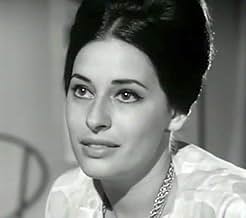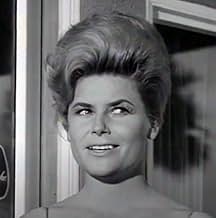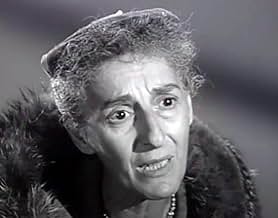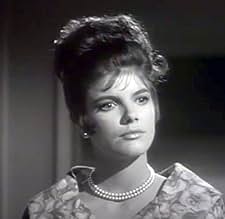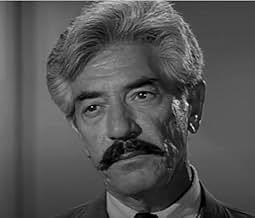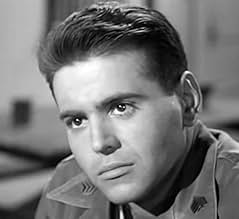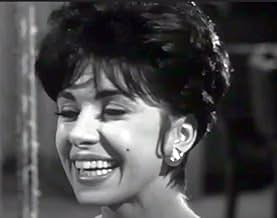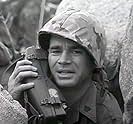Ajouter une intrigue dans votre langueThe trials of a young U.S. Marine Lieutenant and his comrades at Camp Pendleton.The trials of a young U.S. Marine Lieutenant and his comrades at Camp Pendleton.The trials of a young U.S. Marine Lieutenant and his comrades at Camp Pendleton.
Parcourir les épisodes
Histoire
Le saviez-vous
- AnecdotesProducers wanted to follow the tradition of marketing this show by selling a license to produce tie-in toys based on it. They offered this license to Hasbro. Hasbro, however, knew that such license deals often ended up with large amounts of unsold inventory, as demand for the toys would die out once the series had started, or especially after it ended. However, they liked the idea of a military-themed toy line, and this inspired them to create G.I. Joe.
- ConnexionsEdited from The Battle of Gettysburg (1955)
Commentaire à la une
Gary Lockwood ("Follow the Sun") played Marine Second Lieutenant William Tiberius Rice. Rice was a recent graduate of Annapolis, who has been assigned his first command-a rifle platoon. His company commander is Captain Raymond Rambridge (Robert Vaughn), an up from the ranks officer. Richard Anderson (without toupee) had a recurring role as Lt. Colonel Steve Hiland. Linda Evans was in a couple of early episodes as Colonel Hiland's daughter, who flirts with Rice. Don Penny added a lot to the show in a small role as Rice's roommate, advisor and best friend Lt. Stanley Harris.
This fine if forgotten 60-minute MGM drama about the peace time Marine Corps was created and produced by Gene Roddenberry ("Star Trek"). MGM was making "Dr. Kildare" (with Richard Chamberlain) and "Mr. Novak" (with James Franciscus as a high school teacher) at the same time as "The Lieutenant" (1963-64). Bill Rice was not unlike Jim Kildare and John Novak: a young, attractive, educated, idealistic professional man, who still has a lot to learn from an older mentor. All these men were in the Kennedy mold. John Kennedy was murdered two months after this series started. Vietnam would soon escalate.
Twenty-six year old Gary Lockwood was still an apprentice actor when the series started. Lockwood got his last name from early mentor Joshua Logan ("Mister Roberts", "Picnic"), whose middle name was Lockwood. Gary Lockwood had played football at UCLA. He could be violent and quick tempered. Lockwood had seriously hurt a man in a brawl at a party. Lockwood was a guy with a high opinion of his own intelligence and attractiveness. He tried to get out of this series at the last moment, hoping instead to concentrate on films. But the producers and network executives convinced him that there would be unpleasant payback if he backed out of his commitment. Lockwood said being a series star was like being a jet pilot: lots of experts do work behind the scenes and then the pilot gets in the hot seat and makes it all work.
Lockwood told TV Guide that he eventually wanted to be the whole chessboard: actor-writer-producer-director. Warren Beatty (who Lockwood worked with in "Spendor in the Grass") would achieve that ambition, but, alas, not Lockwood. Lockwood, during that interview, was also contemptuous of "insecure" women. He later married the very secure Stephanie Powers.
Thirty year old Robert Vaughn got the same salary per episode as Gary Lockwood, even though Vaughn was usually in only one scene per episode. Vaughn had already been one of "The Magnificent Seven" and had received an Oscar nomination for "The Young Philadelphians", so he may not have been crazy about playing second fiddle to Lockwood. Vaughn was an extremely talented and ambitious man with political aspirations. (He was working on his Ph. D. dissertation at the time.) Vaughn asked MGM and "Lieutenant" executive producer Norman Felton for his own series. The result was "The Man from UNCLE", which began the next season.
Gary Lockwood's performance as Bill Rice got stronger from episode to episode. The best episodes had a strongly written and cast guest star role that Lockwood had to stand up to.
Paul Burke ("Naked City") played an ineffectual Marine captain who would have to leave the Corps for "too long in rank", if he wasn't promoted to major. Rip Torn played a tough drill sergeant, who may be so tough he is killing his trainees. Neville Brand played a brilliant, arrogant brigadier general who is assigned Bill Rice as an aide. Bill Bixby played an old high school friend of Rice assigned to his platoon, who tries to use the relationship to get out of work. Patricia Crowley played the ex-wife of Captain Rambridge. Dennis Hopper played a bigot giving a tough time to a black man in his squad. Andrew Duggan played the hero commander of Rice's platoon during WWII, who may not really have been a hero. (Leonard Nimoy had a showy role as a megalomaniac film director in the Duggan episode). Kathryn Hayes played a school teacher who accuses Rice of attacking her.
In one episode Rice goes back to his home town after his father suffers a heart attack. Rice has a dalliance with a young woman (Sherry Jackson) who he used "to toss the ball around with". Rice's father is the editor/owner of the local paper who thinks Rice is wasting his life as a peace time Marine. The father wants Rice to come back and help run the paper. Rice tells his father that as long as there is a need for the cop on the beat there will be a need for what he does.
In another episode, Andrew Prine played a friend of Rice who is also a young Marine officer. Prine is accused of hit and run driving. Prine asks Rice to defend him at a Marine hearing. Rice suspects Prine's fiancé Katherine Ross is not as sweet as she looks.
In the last episode, Bill Rice is sent on a mission to a Vietnam-like country. Rice kills his first man. At the end of the episode, Rice learns he has been promoted to first lieutenant.
Gary Lockwood never had another series, but he was very solid in many guest star roles through the years. He was particularly good as Major Gus Denver, an orphan, on two episodes of "12 O'Clock High" the next season. Gus Denver got his name because he was left on the steps of an orphanage in Denver in August. Lockwood might have been a more interesting replacement for Robert Lansing on "12 O'Clock High" than Paul Burke.
Producer Gene Roddenberry used Lockwood one more time, in the second pilot for "Star Trek", as Lt. Commander Gary Mitchell.
Lockwood starred in Stanley Kubrick's "2001: A Space Odyssey" in 1968. Kubrick might well have watched a few episodes of "The Lieutenant" when he was deciding whether to cast Lockwood. Maybe Kubrick watched the Rip Torn drill sergeant episode and got the germ of the idea for "Full Metal Jacket".
Many years later TV fan James Cagney said Lockwood was one of his favorite tough guy villains.
This fine if forgotten 60-minute MGM drama about the peace time Marine Corps was created and produced by Gene Roddenberry ("Star Trek"). MGM was making "Dr. Kildare" (with Richard Chamberlain) and "Mr. Novak" (with James Franciscus as a high school teacher) at the same time as "The Lieutenant" (1963-64). Bill Rice was not unlike Jim Kildare and John Novak: a young, attractive, educated, idealistic professional man, who still has a lot to learn from an older mentor. All these men were in the Kennedy mold. John Kennedy was murdered two months after this series started. Vietnam would soon escalate.
Twenty-six year old Gary Lockwood was still an apprentice actor when the series started. Lockwood got his last name from early mentor Joshua Logan ("Mister Roberts", "Picnic"), whose middle name was Lockwood. Gary Lockwood had played football at UCLA. He could be violent and quick tempered. Lockwood had seriously hurt a man in a brawl at a party. Lockwood was a guy with a high opinion of his own intelligence and attractiveness. He tried to get out of this series at the last moment, hoping instead to concentrate on films. But the producers and network executives convinced him that there would be unpleasant payback if he backed out of his commitment. Lockwood said being a series star was like being a jet pilot: lots of experts do work behind the scenes and then the pilot gets in the hot seat and makes it all work.
Lockwood told TV Guide that he eventually wanted to be the whole chessboard: actor-writer-producer-director. Warren Beatty (who Lockwood worked with in "Spendor in the Grass") would achieve that ambition, but, alas, not Lockwood. Lockwood, during that interview, was also contemptuous of "insecure" women. He later married the very secure Stephanie Powers.
Thirty year old Robert Vaughn got the same salary per episode as Gary Lockwood, even though Vaughn was usually in only one scene per episode. Vaughn had already been one of "The Magnificent Seven" and had received an Oscar nomination for "The Young Philadelphians", so he may not have been crazy about playing second fiddle to Lockwood. Vaughn was an extremely talented and ambitious man with political aspirations. (He was working on his Ph. D. dissertation at the time.) Vaughn asked MGM and "Lieutenant" executive producer Norman Felton for his own series. The result was "The Man from UNCLE", which began the next season.
Gary Lockwood's performance as Bill Rice got stronger from episode to episode. The best episodes had a strongly written and cast guest star role that Lockwood had to stand up to.
Paul Burke ("Naked City") played an ineffectual Marine captain who would have to leave the Corps for "too long in rank", if he wasn't promoted to major. Rip Torn played a tough drill sergeant, who may be so tough he is killing his trainees. Neville Brand played a brilliant, arrogant brigadier general who is assigned Bill Rice as an aide. Bill Bixby played an old high school friend of Rice assigned to his platoon, who tries to use the relationship to get out of work. Patricia Crowley played the ex-wife of Captain Rambridge. Dennis Hopper played a bigot giving a tough time to a black man in his squad. Andrew Duggan played the hero commander of Rice's platoon during WWII, who may not really have been a hero. (Leonard Nimoy had a showy role as a megalomaniac film director in the Duggan episode). Kathryn Hayes played a school teacher who accuses Rice of attacking her.
In one episode Rice goes back to his home town after his father suffers a heart attack. Rice has a dalliance with a young woman (Sherry Jackson) who he used "to toss the ball around with". Rice's father is the editor/owner of the local paper who thinks Rice is wasting his life as a peace time Marine. The father wants Rice to come back and help run the paper. Rice tells his father that as long as there is a need for the cop on the beat there will be a need for what he does.
In another episode, Andrew Prine played a friend of Rice who is also a young Marine officer. Prine is accused of hit and run driving. Prine asks Rice to defend him at a Marine hearing. Rice suspects Prine's fiancé Katherine Ross is not as sweet as she looks.
In the last episode, Bill Rice is sent on a mission to a Vietnam-like country. Rice kills his first man. At the end of the episode, Rice learns he has been promoted to first lieutenant.
Gary Lockwood never had another series, but he was very solid in many guest star roles through the years. He was particularly good as Major Gus Denver, an orphan, on two episodes of "12 O'Clock High" the next season. Gus Denver got his name because he was left on the steps of an orphanage in Denver in August. Lockwood might have been a more interesting replacement for Robert Lansing on "12 O'Clock High" than Paul Burke.
Producer Gene Roddenberry used Lockwood one more time, in the second pilot for "Star Trek", as Lt. Commander Gary Mitchell.
Lockwood starred in Stanley Kubrick's "2001: A Space Odyssey" in 1968. Kubrick might well have watched a few episodes of "The Lieutenant" when he was deciding whether to cast Lockwood. Maybe Kubrick watched the Rip Torn drill sergeant episode and got the germ of the idea for "Full Metal Jacket".
Many years later TV fan James Cagney said Lockwood was one of his favorite tough guy villains.
- Cheyenne-Bodie
- 16 sept. 2006
- Permalien
Meilleurs choix
Connectez-vous pour évaluer et suivre la liste de favoris afin de recevoir des recommandations personnalisées
- How many seasons does The Lieutenant have?Alimenté par Alexa
Détails
- Date de sortie
- Pays d’origine
- Langue
- Aussi connu sous le nom de
- El teniente
- Lieux de tournage
- Sociétés de production
- Voir plus de crédits d'entreprise sur IMDbPro
- Durée1 heure
- Couleur
- Rapport de forme
- 1.33 : 1
Contribuer à cette page
Suggérer une modification ou ajouter du contenu manquant

Lacune principale
By what name was The Lieutenant (1963) officially released in India in English?
Répondre

